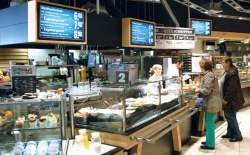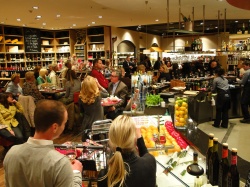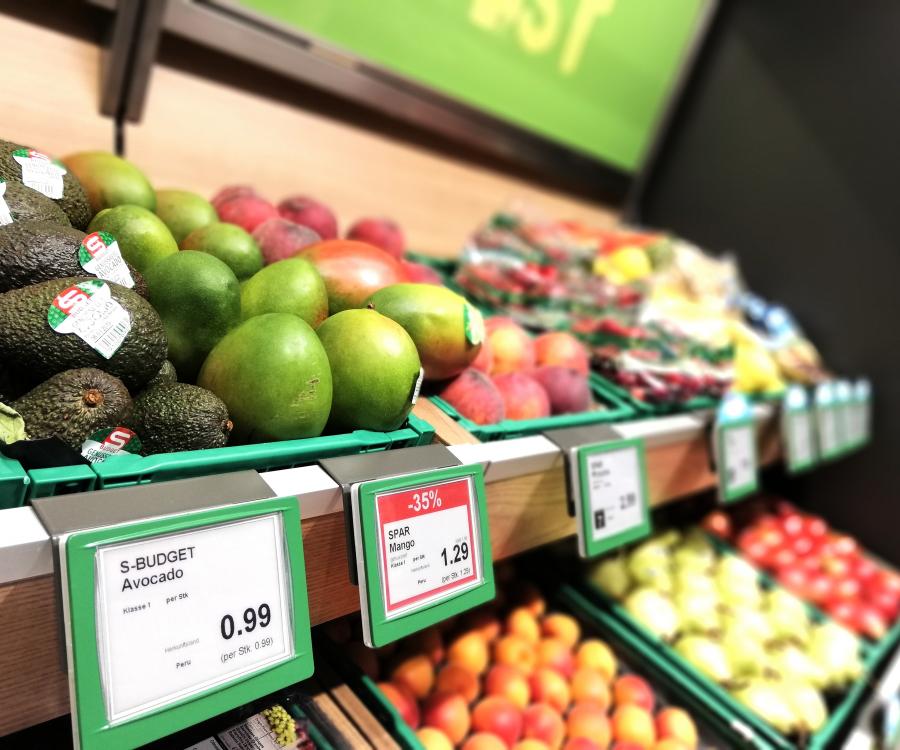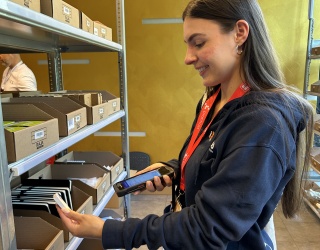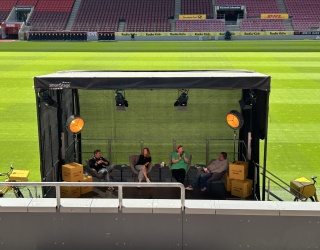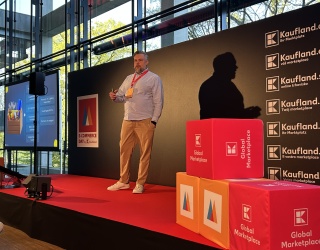An integration of gastronomy concepts doesn’t just lend itself to food retailing; there is also big potential in shopping centers and not only for bakery, butcher, and snack shops. Generally today appealing gastronomic choices provide an increased customer dwell time and emotionalization of the shopping experience.
Turning customers into guests
It is no secret that brick-and-mortar retailing needs to offer customers a special shopping experience today if it wants to prevail against competitors on the Internet. This is not just about an attractive sales floor design and the integration of modern digital technology at the POS. Brick-and-mortar retail needs to utilize all opportunities to increase the feel good factor and, therefore, the dwell time. Gastronomic zones can also contribute to this.
Today many retailers pursue a comprehensive master concept when they integrate gastronomy zones. In the interior design of its remodeled Toom supermarket in the Hessian Egelsbach, the REWE Group also focused on a harmonious integration of the gastronomy choices. The special calling card of the supermarket is the so-called "Fresh Market“ which includes an integrated restaurant, an in-house bakery as well as a salad bar and service counters featuring international and regional delicacies. “We believe that we can stand up to online retailers with this concept,“ says Jürgen Scheider, Regional Manager Mid-Division for Rewe Group.
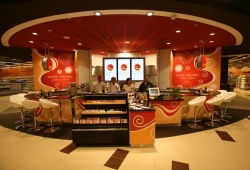
The gastronomy selection should fit into the range of products
As any shopfitter is likely to attest, these days, stores are no longer just simply being furnished. Instead, entire marketplaces are being created that not only feature a homogeneous design but also invite customers to stay a little longer by offering gastronomic treats. Store design and product selection should follow a clearly recognizable line that is also mirrored in the design of the gastronomy area.
The gastronomy selection also needs to match the environment – a fashion retailer, for instance, cannot integrate a full restaurant in his stores, if nothing else because of potential unpleasant odors. However, a coffee bar like the ones already offered at several major bookseller stores, for instance, is perfectly suited for this type of retailer. Lounge type areas also invite the customers to dwell. A champagne bar would be an idea for a more exclusive fashion store to reflect the high priced ambiance. Shopping mall operators have a somewhat easier time in this case of course since they have ample space to implement both a wide gastronomic selection as well as a large variety of stores – albeit in different locations of course.

Special gastronomy concepts not only offer retailers the chance to increase the dwell time of customers, but also the option to differentiate themselves from the competition. Unusual ideas that direct surroundings are not able to offer also attract customers into the store when they actually prefer a store of a competitor.
One example of this is EDEKA Zurheide in Düsseldorf, which attracts customers from the entire metropolitan area and the surroundings with its Gourmet Bistro. The upscale restaurant was chosen as one of the best restaurants in the South of Düsseldorf by the local gastronomy magazine “Düsseldorf geht aus!" (Düsseldorf eats out).The market operators also make a point of having the dishes only prepared with products that can be purchased at the market. In doing so, gastronomy also attracts sales to the stores. Another important factor being considered is the adventure vibe. The Gourmet Bistro, the integrated Grill Point and the counter by the Sushi Factory work with open kitchen events. What’s more, the supermarket operator hosts regular special customer events such as the Zurheide Gourmet Festival, for example, where culinary creations are presented each year under a special theme.
Properly implemented, retailers thus have many different opportunities to attract customers into their stores with new culinary ideas and not only differentiate themselves from e-commerce but also from local competitors with their biggest unique selling point: the shopping experience.
Author: Daniel Stöter, iXtenso.com

